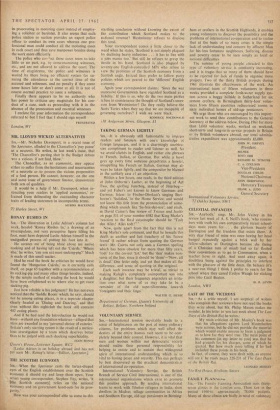TAKING GERMAN LIGHTLY
SIR,—It is obviously still fashionable to impress readers and 'listeners with one's knowledge at foreign languages, and it is a charmingly unobtru- sive compliment to reader and listener as well. So we avoid click's in English, and rather cite phrases in French, Italian, or German. But while a howl goes up every time someone perpetrates a howler, misspelling his French or Italian, German may al- ways be taken lightly, and the compositor be blamed in the unlikely case ef an objection.
Within a few hours. one reads, in the third edition of John Osborne's Luther, at the beginning of Act Two, the spelling Juterbilg, instead of liiterbog- and yet Faber's are known to know Germans and German; listens to Fischer-Dieskau's singing Beet- hoven's 'Satisfied.' in the Home Service. and would not know this title from the pronunciation of some- thing which sounds like 'Su-free-dee-nee'; and reads, in David Cairns's fine review of Tristan and Isolde on page 511 of your number 6982 that King Marke's 'reaction to the final catastrophe should be "Todt den Alles! Alles todt!"'
Now, quite apart from the fact that this is not King Marke's sole comment, and that he bewails this death as another and last treachery of his 'fairest friend' (I rather refrain fro'm quoting the German text)--Mr. Cairns not only uses a German spelling which has been obsolete for more than fifty years, 'todt' for the correct 'tot,' but the 'den' makes non- sense of the line, since it should be 'denn'—'Now, all is dead.' One letter only, and yet that makes all the difference, and sense of quoting in the original.
Each such instance may be trivial, as trivial as making Ralegh's completely unimportant son into a daughter, but their frequency engenders an irrita- tion over what some of us may take to be a reminder of the old superciliousness towards 'foreigners and their lingo.'
WALTER 0. HESSE
Department of German, Queen's University of Belfast, Belfast, Northern Ireland














































 Previous page
Previous page